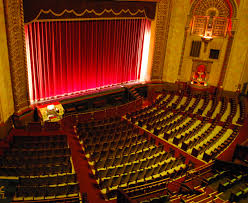中文词源
theater 戏院,剧场,戏剧,手术室
来自拉丁语 theatrum,戏院,剧院,来自希腊语 theatron,戏院,剧院,来自 theaomai,看,观察, 词源同 theory.-trum,-tron,-ther,-der,工具格后缀,或表位置,词源同 tether,rudder.后引申词义 手术室等。
英语词源
- theater (n.)
- late 14c., "open air place in ancient times for viewing spectacles and plays," from Old French theatre (12c., Modern French théâtre, improperly accented) and directly from Latin theatrum "play-house, theater; stage; spectators in a theater" (source also of Spanish, Italian teatro), from Greek theatron "theater; the people in the theater; a show, a spectacle," literally "place for viewing," from theasthai "to behold" (related to thea "a view, a seeing; a seat in the theater," theates "spectator") + -tron, suffix denoting place.
Meaning "building where plays are shown" is from 1570s in English. Transferred sense of "plays, writing, production, the stage" is from 1660s. Generic sense of "place of action" is from 1580s; especially "region where war is being fought" (1914). Spelling with -re arose late 17c. and prevailed in Britain after c. 1700 by French influence, but American English retained or revived the older spelling in -er.
权威例句
- 1. He became known as the enfant terrible of British theater.
- 他成为英国戏剧界让人头痛的天才。
- 2. Theater owners lease films from film distributors.
- 剧院老板从电影发行商处租电影放映。
- 3. a restaurant catty-corner from the theater
- 斜对着剧院的餐馆
- 4. He could amuse us for hours with his stories of the theater.
- 他能接连几小时地为我们讲戏剧故事逗我们发笑.
- 5. Excuse me, where is the entrance to the theater?
- 请问剧院的入口在哪里?
